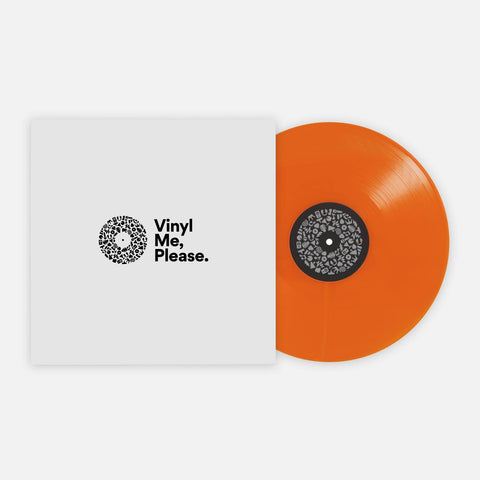Every week, we tell you about an album we think you need to spend time with. This week’s album is Bjork’s Utopia.
“Forelsket” is a Norwegian word for which we lack an equivalent in English. It’s closest emotions are love or infatuation, but forelsket is something different altogether. Forelsket suggests a newness, an anticipation, a blossoming relationship. It’s more visceral, euphoric—the feeling of hot weightlessness that accompanies the spark of immediate connection. It’s optimism, an emotional investment. You know, the flush. It’s meant to imply a removal from the quotidian realities of earth in favor of a bodily heaven, of sorts. A Utopia.
It’s impossible to get a comprehensive picture of Utopia — arguably Bjork's most beautiful album to date — without considering 2016’s Vulnicura, Bjork’s last album. The album documented, in personal detail, the hopelessness following her breakup with artist Matthew Barney, the father of her daughter. If you listen to it with complete personal surrender — the way Bjork’s catalogue deserves, requires — you were next to her as the ship went down, and next to her inside the wreckage afterward. Co-produced by Alejandro Ghersi (Arca), the sonic environment is rigid, claustrophobic, scary, giving heightened awareness to the slow passage of time in moments of pain. The album’s notes even included timestamps for the first six songs: “9 months before” to “11 months after.” It was a testament to the human tendency to document the deepest agony to keep us from going insane in order to find meaning. “Moments of clarity are so rare / I better document this,” she sings on “Stonemilker.”
But within Vulnicura’s disorienting darkness, she makes a declaration of healing on “Atom Dance:” “I am fine tuning my soul / To the universal wavelength / No one is a lover alone / I propose an atom dance.” Utopia is her follow through; it’s a ritual of opening the windows, airing out old, putrid air, and creating a space for light to come in. Utopia is the feeling of lightness, of forelsket, after you’ve forgotten what it’s like to feel it.
In its announcement, she joked it was her “Tinder album.” And while it bears very little resemblance to what you’d ever imagine Tinder would sound like, much like Tinder, it similarly embodiesz seemingly endless people and possibilities, a search for something new. “It’s about that search [for utopia] – and about being in love. Spending time with a person you enjoy on every level is obviously utopia, you know? I mean, it’s real. It’s when the dream becomes real,” Bjork told Dazed.
Aside from Bjork’s own personal narrative of breaking and healing that ties her last two albums together, Ghersi is another thread that binds the two albums. He cowrote Utopia, and its inception came from his work. Bjork began the album when she came across one of his old tracks “Little Now A Lot.” “I just thought it was the most happiest firework that he’d ever done,” she told FACT magazine. She used it to weave together the opening track “Arisen My Senses,” a beautiful, erotic track that sounds like the goosebumps of being naked with someone new for the very first time.
What Bjork and Ghersi — who co-wrote and co-produced the album — share more pointedly than any artistic duo working right now, is the ability to create an entire universe through sound alone and force listeners inside of it. It’s nothing short of a miracle. While somewhat polar from one another, Ghersi’s brilliant devices are at work on both Vulnicura and Utopia, the most obvious being genius layering. But the layers function oppositely on either album. On Vulnicura, the sonic layers became weights — on on top of the other — weighing us down, but on Utopia, the layers become dimensional planes — new places within a Utopia to explore. There’s a slowing of time to Utopia too, but instead of the slow tick of agony in Vulnicura, it’s a savory presence. You feel lucky to be where you are, and you don’t want to leave. If you’re really listening to Utopia, you probably can’t do much else because you’re lost in it, surrounded by the sound of flutes, choruses, loons, and a plethora of unidentifiable alien sounds.
While centered around the concept of love, erotics and connection, Utopia is also futuristic thinking on a larger scale. In this way, one could think of forelsket — a word intended for a deeply personal feeling — as a societal ideal as well. The beginnings of a new connection between two people, born our of mutual trust in any kind of future together, can be so powerful. Terrifying and vulnerable, of course, but powerful. In Utopia, Bjork imagines what that kind of optimistic emotional investment, in place of an apathetic impending doom, might do to our world.
"We have Trump, we have Brexit, we have our issues in Iceland, we have our environmental issues...I think if there ever was an urgency or necessity to come up with another Utopian model, how we're going to live our lives, I think it's now, and [these are] my proposals," She said in a Facebook Live in September discussing Utopia. She later told the New York Times, “If optimism ever was like an emergency, it’s now.”
Amileah Sutliff is a New York-based writer, editor and creative producer and an editor of the book The Best Record Stores in the United States.
Join the Club!
Join Now, Starting at $36Pages












